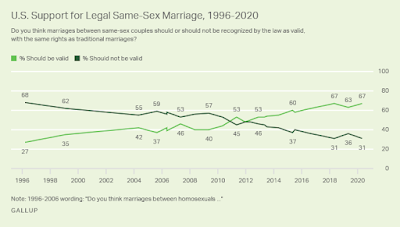
Gallup Values and Belief poll, May 2021, in Record-High 70% in Justin McCarthy, "U.S. Support Same-Sex Marriage"
Some noteworthy recent commentary on the cross-party move in the U.S. Senate to offer legislative protection to same-sex marriage — though the details of this move are not yet entire clear — and on the political connections between that issue and the abortion issue. Jennifer Rubin, "The Senate’s victory on same-sex marriage should terrify the GOP," notes that for Republicans to go after same-sex marriage when they are still smarting from the political reaction to the highly unpopular Dobbs ruling would be politically unwise, to say the least:
A critical mass of Republicans understand that same-sex marriage is here to stay. Whatever their personal views, they grasp that opposition to it signifies a level of bigotry even many GOP voters are unwilling to tolerate. The simple political reality is this: Outside deep-red enclaves, Republicans cannot maintain their anti-same-sex marriage stance without marginalizing themselves. It’s part of a slow recognition that their adoption of Christian nationalist positions alienates a substantial portion of voters.
Ruth Igielnik, "Backdrop for Vote on Same-Sex Marriage Rights: A Big Shift in Public Opinion," parses the data backing up Jennifer Rubin's analysis:
Seven in 10 American adults said in May of this year that marriage between same-sex couples should be recognized by the law, a record high according to Gallup. That represents a near complete reversal proportionally in the public’s views over the last 30 years. In 1996, when President Bill Clinton signed the Defense of Marriage Act, which defined marriage as between a man and a woman, nearly seven in 10 Americans said same-sex marriages should not be recognized by the law. Only about one-quarter said they should be valid.
Public support for same-sex marriage has grown since then. In 2004, when Massachusetts became the first state to begin issuing same-sex marriage licenses, 42 percent of Americans supported legalizing same-sex marriage. And by 2015, when the Supreme Court ruled in Obergefell v. Hodges that same-sex marriage was a constitutionally protected right, 58 percent of the public supported legal same-sex marriage.
Still, at the time of the 2015 ruling, just 30 percent of Republicans backed the change. Since then, support among Republicans has grown substantially, with a majority now in favor of same-sex marriage.
Support has been largely driven by younger Republicans. According to Pew Research Center, 64 percent of Republicans ages 18 to 29 say the legality of same-sex marriage is a good thing for society, compared with 30 percent of Republicans ages 65 and older.
Even in some of the deepest red states across America, support for same-sex marriage is trending upward. ...
Religion once stood as a dividing line in how Americans viewed same-sex marriage, but even some of those barriers have begun to fall. Pew found that more than six in 10 Catholics and white mainline Protestants favored same-sex marriage, up substantially since 2001. And while fewer Black Protestants and white evangelical Protestants are in favor, support has grown among both groups over the last two decades.
Charlie Sykes, "No Sex, Please. We’re Republicans," note that, despite these statistics, a group of Republicans including Ben Shapiro want the GOP to stand defiantly against same-sex marriage and damn the political consequences. Sykes writes,
More than 7 in 10 Americans — including a majority of Republicans — think "marriages between same-sex couples should be recognized by the law as valid, with the same rights as traditional marriages."
Then he reports on a conversation he and David Corn have just had about the Republican party's attitude towards sexual matters — or, rather, the attitude of some leading Republicans:
David Corn: What I find interesting, and I'm happy to see them do this, is that a lot of MAGA Republicans — the Charlie Kirks of the world, the Steve Bannons —are out there saying the real problem is that young, single women voted for Democrats. And they depict them as young, bitter, angry, single women — because they're not married.
Charlie Sykes: “Cat-owning skanks.” Yeah, that's a winning message.
Corn: “I think it's pretty clear. So, the anti-sex, anti-young woman party.” ...
Sykes: Good luck.
Corn: Go for that.
On the topic of abortion and the Republican party, Jill Filipovic, "They're coming for contraception. They're coming for IVF," notes the recent phone call of Tennessee Right to Life to GOP legislators urging them to hold the line on abortion (i.e., on a national abortion ban), which I mentioned in a previous posting. She writes,
And The Guardian points to the paradoxical fixation of authoritarian governments with pronatalist policy that seeks to diminish access to contraception and abortion at the very moment the global population reaches 8 billion.The anti-abortion movement, though, has not been brought to heel. Instead, it is more emboldened and aggressive than ever. And its leaders are clear about what they believe the future holds: A public that grows acclimated to extreme abortion restrictions, and laws that will limit IVF and contraception.
The leaders of the anti-abortion movement are saying as much on private phone calls with Republican politicians. ...
That’s why this latest recorded phone call is so important: It makes clear that there is a longer-term strategy here. The pro-life movement knows that banning IVF and many popular and highly-effective forms contraception would be wildly unpopular, enough to create huge political backlash even on the right. So they’re using the same strategy they used for abortion rights: Take the question out of the hands of individuals, and even out of the hands of voters; chip away at rights at a steady clip to acclimate the public to the very idea that these rights are up for debate; install members of a reactionary minority into positions of power and have them rule over all of us.
What's that about, one wonders?

